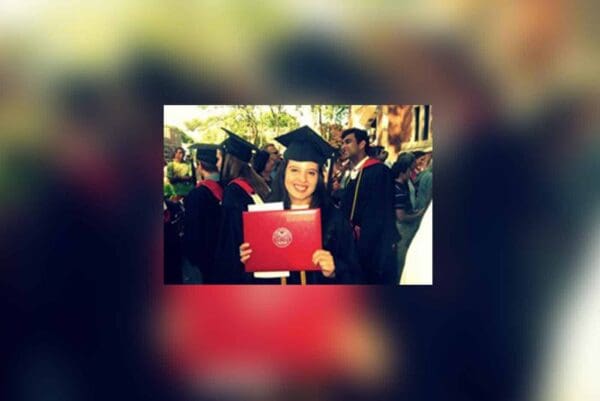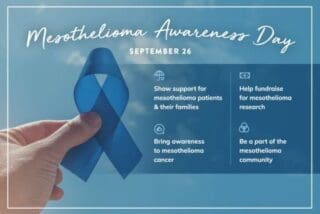
We are pleased to announce the winner of the Fall 2017 Mesothelioma Cancer Alliance Scholarship is Natalia Jaramillo, a doctoral student specializing in clinical psychology at the University of California, Santa Barbara (UCSB).
In 2014, Jaramillo received an unexpected call from a nurse in New York. She learned her father was extremely sick, and it was urgent that she travel back from California to see him. Before she arrived, Jaramillo didn’t realize that surprise call would change her life forever. “My father was a healthy 52-year-old man, he worked in construction and taught salsa dancing in his free time. He was vibrant, strong, gentle and loved by so many people in our community and also in his home country of Colombia,” she explained in her essay.
“When I arrived to see him at the Intensive Care Unit (ICU), I could not believe how weak and vulnerable he looked,” Jaramillo continued. “I felt so powerless at that moment and the only thing that I could do was to hold his hand and stay by his side.” After several weeks in the ICU, her father was transferred to the Albany Medical Center. She recalls a countless stream of doctors in and out of the room trying to solve her father’s complex case.
Answers didn’t come until doctors decided to try gastric surgery to help him eat and hopefully put on some weight. The surgery sadly revealed cancerous tumors spread throughout his stomach. Their family was told he’d have only a short time to live, and there were no treatment options available for him. So after recovering from surgery, her father returned home to live out his final days doing what he loved. “He lived his life with honesty and courage until the very end, and did everything he could to help the people around him,” Jaramillo wrote in her essay.
Dedication to Impactful Research
After his death, Jaramillo reassessed her life goals and decided to dedicate her research to identifying ways young people cope with trauma and stress. She went right to work at Children’s Hospital Los Angeles (CHLA) in the Pediatric Intensive Care Unit (PICU), where she began conducting a research study around understanding what children and their parents experience in this environment. Her study led her to interviewing a twelve-year-old boy recently diagnosed with advanced leukemia, who she got to know over the course of several weeks.
Jaramillo recalled his struggles to breathe as she interviewed him, but his insistence that he was able to continue with the interview and didn’t need a break. She was inspired by his courage, but learned an even more valuable lesson from him. At the end of her interview, Jaramillo asked him about the most difficult thing he had experienced in his life, expecting his answer to be about his leukemia and the pain he’s dealt with going through treatment. But the boy broke down and said, “The most difficult thing I have ever experienced in my life is being bullied at school. For years, I was made to feel inferior by my peers and spent a lot of time on my own.”
The interview made her realize the wide range of traumatic experiences youths could encounter, and how these experiences can impact them even more than a grim diagnosis. Her two years at CHLA gave her the opportunity to interact with a number of families dealing with their own trialing times. Her studies and interactions made Jaramillo realize her desire to develop evidence-based interventions for the diverse needs of young adults exposed to trauma.
Fueled by her discoveries and her own passion for learning how mental health impacts Latino communities, Jaramillo decided to lead a study among Latino families admitted to the PICU. “I wanted to identify whether Latino children experienced higher symptoms of acute stress disorder and report higher pain scores than non-Latinos,” she wrote. “Extant research shows higher traumatic stress symptoms in Latino adults, yet this topic has not been examined among children.”
Her study included 59 participants in the urban CHLA PICU, and found no significant difference between stress or pain scores among the Latino and non-Latino youth in the hospital. She was able to present her findings in a poster and symposium at the Society of Critical Care Medicine’s annual congress. “The applicability and importance of this research at CHLA affirmed my desire to pursue a life-long career as a clinical researcher,” Jaramillo explained.
A Bright Future
Jaramillo is now starting her first year as a doctoral student in the clinical track of the Counseling, Clinical and School Psychology program at the UCSB. She explained her research throughout her six-year program will focus on “examining the coping mechanisms and resilience of youth who experience traumas or are exposed to violence, particularly focusing on ethnic minority and immigrant populations.” Her goal is to make an important contribution to the field and live her life serving others in need.
As she begins her studies, Jaramillo is grateful for the additional opportunities the Mesothelioma Cancer Alliance Scholarship will allow her. “Being able to receive the scholarship would allow me to spend more time in my studies, take more time to volunteer in the community and mentor undergraduate students who also want to attend graduate school, without the worry of financial burden. My long-term goal is to become a leading scholar, clinician, and mentor at a research university.”
“My professional goals, whether research, clinical, or academic are entwined with the need to assist those in need and give back to my community,” Jaramillo continues. “I know that it will be a challenging path, but I am fortunate to have my father’s presence and support with me through all of the obstacles that I might encounter.”
The Mesothelioma Cancer Alliance is honored to present the scholarship for the Fall 2017 semester to Jaramillo, who has dedicated her life to serving young people in need. We look forward to seeing the difference she will make in so many lives as she continues her studies and research
Applications for the Mesothelioma Cancer Alliance Scholarship for Spring 2018 are now open. If you have had cancer, or have seen a loved one go through a battle with cancer, submit your essay today and receive a chance to win $4,000 toward your college education. The deadline for the Spring 2018 semester is December 1, 2017.




